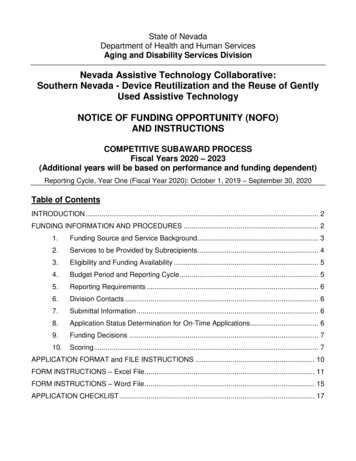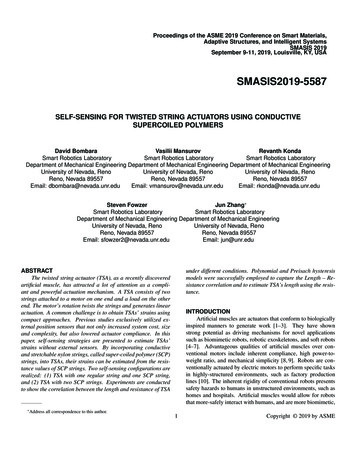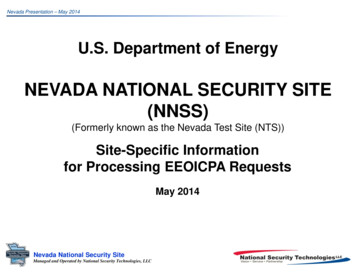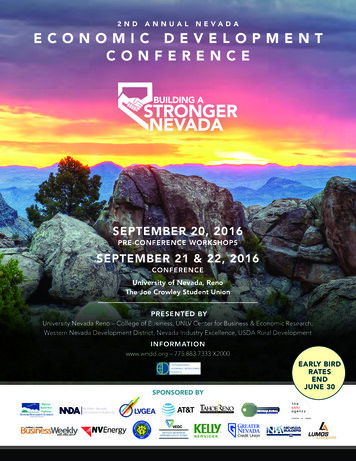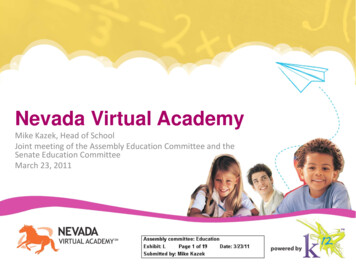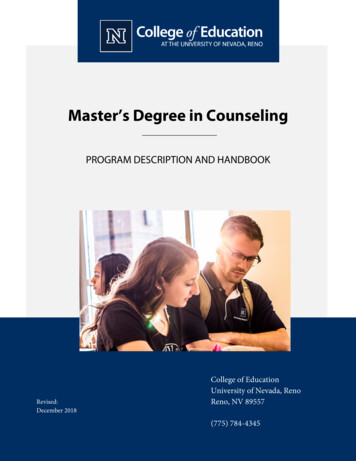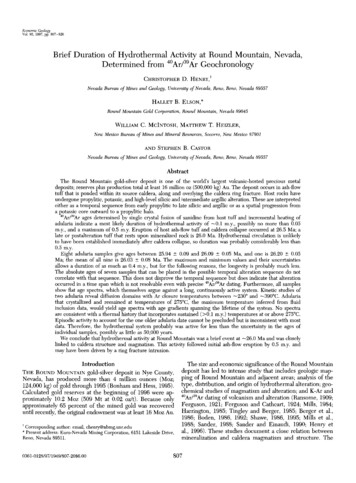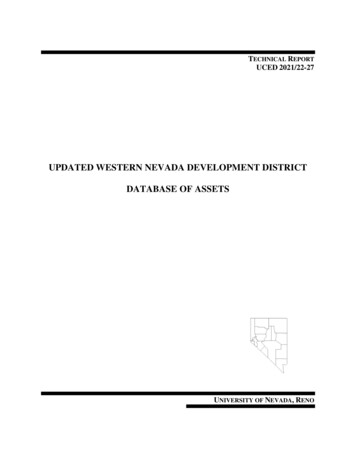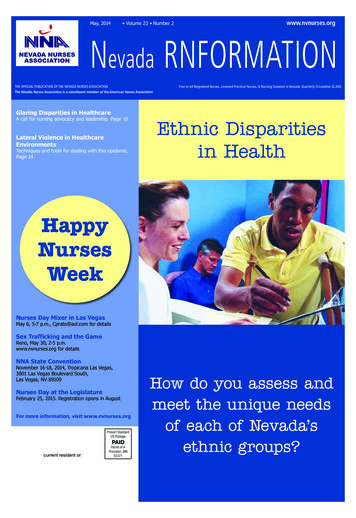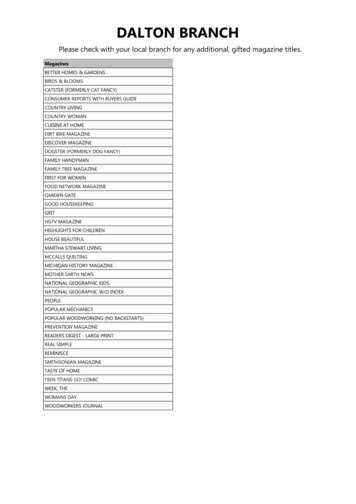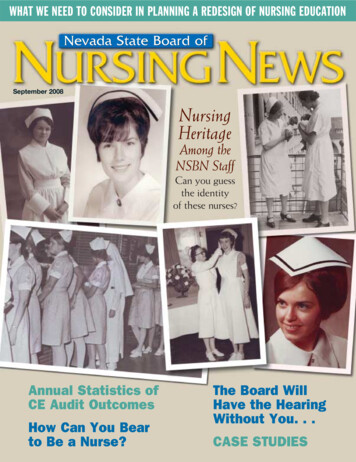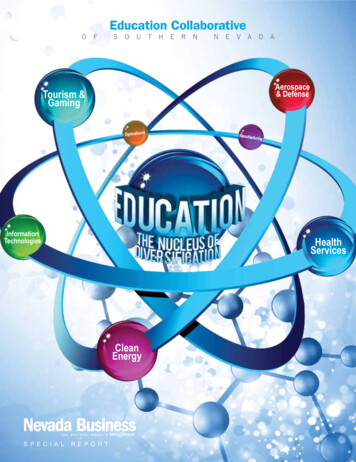
Transcription
Education Collaborativeo fS o u th e r nNev ad aAerospace& DefenseTourism ingHealthServicesCleanEnergy
o fTEducation CollaborativeS o u t he r nN e v a dahe new economic realities in Southern Nevadbusiness practica have promptes and strategied a re-examineswithin virtuallyto informationation ofevery local indutechnology, edstry. From bankucfacturing, orgaationtohealthcare, gaminingnizations and firg and hospitalitms have beenTo be sure, thesy to manuchallenged to ree re-examinatiothink how busins have requirefront long-standness gets doned honest inquirying conventions.and the courag. The higher edactively engageeuctoatcoion sector in Sound in these discussions. Nevadthern Nevada haues to be viewa’s economic stsbeed by local camenruggles have bepus leaders (andvoice in higheren and contincommunity stakeducation suggeholders), as onested, “as an occawhether theree respectedsion for a candare ways to liftid re-appraisalthe performancelevels.”to discoverof our institutions of higher learOne such grouningto higherp that has come together to advada Higher Eddress these chucation Collaboallenges is therative. This grtions of higherSouthern Neoup – made upeducation in Nofpublic and privevada – is focuSouthern Nevadate institused on answera’s higher educing key questioation infrastructrevitalization thns,suchas howureaids in the econat is so criticallyomic diversificaneeded in thisThe Collaborativsttioate.n ande is unified bya shared purpis to improve Sose. In the longouthern Nevadterm, its primara’s performanceGrowth in the siy objectiverelative to colleze, diversity angedegree attainmd socio-economulation will requent rates.icdisparity of the reire bold and ingion’s college-gnovative actionlikely and, in sooing popbest achieved thme cases, unlikrough collaboraely allies. Thatship is compotion amongthe Higher Educsed of public noation Collaborat-for-profit, privhigher educatiotive’s memberate not-for-profin is evidence tht and for-profitat conventionaorder to achievinstitutions ofl boundaries are large scale anebecoming lessd lasting changeern Nevada.important inregarding degree productivityIn the near termwithin South, the Collaborative will be engarole of higher edged in broaderucation in regiondiscussions foal developmento restructurecusing on thet.With the recentits economic desuccess of Nevvelopment opercally about deveada’s effortsations, now is thloping and imple time to thinkementing a regipresents in cleacritional businessr and definableplan. Such a plterms, the logineeded to achian,stical and finaneve Southern Ncial resourcesevada’s objecttion serves as aions. Because highmajor gatewayer educato prosperity, oncore goals is toe of the Collaboserve as a unifirative’sedvoice during thisregional planning and developmcritical time ofent.special report January 2012Copyright 2012 Reproduction Prohibited Unless Authorized By Publisher
HigherEducationCollaborativeBy Jennifer Rachel BaumerThe Higher Education Collaborativewas formed in Southern Nevada in 2010with the aim of answering multiple needsfor post-secondary education, the community, residents and the Valley’s economy.The organization is especially relevanttoday with the challenges to Nevada’seducation. According to 2008 Censusdata, of the 1.4 million working ageadults (24-65 years old), only 30 percenthave an associates degree or higher.This puts Nevada in the bottom tier ofeducation rankings in the nation andillustrates the necessity of improvingthose rankings.The Collaborative gives institutions achance to speak with one cohesive, andtherefore stronger, voice. “Institutionsof higher education often face the samechallenges or difficulties that need to beaddressed either through governmentalagencies or through other means” saidDr. Renee Coffman, dean, College ofPharmacy, Roseman University of HealthServices. “When we speak together withone voice, we have a much more powerfulstatement.”“We wanted to bring together a consortium of people to speak specifically to whatthey’re experiencing,” said Kathy Gamboa, campus director, territory vice president, University of Phoenix. The collectiveknowledge of all the higher education institutions brings power to the voice of education in Nevada. This is truly a cohesivegroup of people who are coming togetherto raise the bar of education in Nevada.”It’s also a chance for higher educationinstitutions to take a collective look at whattheir students are struggling with and provide opportunities, finding jobs in Nevadaand facilitating growth.special reportCopyright 2012 Reproduction Prohibited Unless Authorized By Publisher
The Power ofEducationMedian weekly earningsby educational degree*Rate of unemploymentby educational degree*Less than a high school diploma 444High school diploma 626College (no degree) 712Associate degree 767Bachelor’s degree 1,038Master’s degree 1,272Doctoral degree 1,550Less than a high school diploma14.9%High school diploma10.3%College (no degree)9.2%Associate degree 7.0%Bachelor’s degree 5.4%Master’s degree 4.0%Doctoral degree 1.9%*2010Source: Bureau of Labor Statistics, Current Population Survey.Last modified May 4, 2011.6Higher Educationwww.NevadaBusiness.com
Higher Education Collaborative“The goal of the Education Collaborative is to network and support one anotherto provide increased awareness of all theeducational opportunities available toresidents in our community,” said MicheleAnderson, M.Ed., regional director of admissions, Lesley University.One important aspect of the Collaborative is the sharing of information, according to Gamboa. “It’s important for us tolook at education from a community perspective because education is a community effort and something that [we] can bea part of. We take that approach when welook at it to see how we can be inclusive, bea partner with other institutions, and sharebest practices.”Different institutions may face different issues, but they also share many. Thoseissues include funding, awareness and uncertainty in how student financial aid willbe administered in the future.Many post-secondary education institutions in the Valley are facing similar issuesChancellorDan KlaichNevada System ofHigher EducationWhat advantages has youreducation provided?“Education changed my familytree. A college education took myfather out of a copper mine in Elyand gave him the chance to provide a better life for his family. Mysiblings and I were able to capitalize on that with our college educations and we are doing the samefor our children and grandchildren.Education has made us morecompetitive in the job market, andin my opinion, more responsiblestewards for the communities inwhich we live.”but more than that, they’re working for thesame goals: to create a culture of educationin Nevada.Awareness is important. Understandingthat Nevada has a plethora of educationalopportunities for students is part of building a culture of education in Nevada.“It’s vital to the success of our economy(improving education),” said Julie Williamson, director of academic support at EmbryRiddle Aeronautical University. “Throughthe collaborative, we’re trying to increaseawareness of educational opportunities forpeople living in Southern Nevada.”“One of our issues is lack of presence,”said Kevin Miller, campus director, RegisUniversity, Las Vegas. “A group like [theEducation Collaborative] would definitelyget our name out there. I think that’s veryimportant. We’ve been in the Vegas areafor 12 years and we’re still a very well keptsecret, unfortunately. Any time you canuse all those players as a way to get everyone’s name out front helps us all.”BE MORE THAN A LEADER.BE AN INFLUENTIAL LEADER. Don’t settle for just success in your career.Become influential and make the world a betterplace. Regis University College for ProfessionalStudies not only has the degrees adult learners wantin business, computer sciences, counseling, education,the humanities, and more, but we teach an academicallyrigorous core curriculum that provides you with thecritical thinking and problem-solving skills you need tobecome a responsible leader. The type of leader whocreates solutions that make a difference. 1.800.670.8738You’ll change your life and change the world. And yourcareer will never be the same again. Experience thepower of influence.BE INFLUENTIAL. CPS.Regis.edu/beinfluential1401 N. Green Valley Pkwy., Henderson Read more onlineNE VA D A · C O L O R A D O · O N L I N EHigher Education Collaborative7
Higher Education Collaborative“As the population in the state grewrapidly it was necessary to move beyond just state supported [schools] andso a number of private universities cameto Nevada, Touro University was one ofthem,” said Dr. Michael Harter, seniorprovost and CEO of Touro University.“I think the education infrastructure hasprofited from the private sector movinginto Nevada. So many still think of highereducation in terms of the [state] supportedprograms. There’s a whole lot more herethan that.”A SharedVisionThe Collaborative formed with a threeprong plan, every angle of which is tiedinto the very idea behind the name: collaboration.Valerie E. WeberUniversity of PhoenixWhat can the EducationCollaborative Accomplish?“The Higher EducationCollaborative is adding a newdimension to our communitydiscussion. Nevada is a greatplace to live, learn, work andplay.”The first of the directives is information-based – getting the information outto Nevada businesses, organizations, agencies, government and educators. variousNevada StateCollegeAs the newest institution of higher learning within the Nevada System of Higher Education, Nevada State College is a comprehensive, fully accredited college with a commitment to educating students for success in the real world.Nevada State College is a dynamic, young institution bursting with growth and thethrill of opportunity. Since its founding in 2002, NSC’s student body has grown to encompass more than 3,100 students representing a broad array of cultural and economicbackgrounds, and its 1,400-plus alumni are living and working in every corner of thestate and beyond.The College’s 509-acre main campus is located in Henderson, Nevada, just 15 milesfrom the world-famous Las Vegas Strip. The College also has a satellite campus in downtown Henderson and offers dual enrollment programs in partnership with communitycolleges across the state.NSC offers more than 24 majors and minors leading to the bachelor’s degree. In everyfield of study, classes are taught by experienced faculty who serve as mentors and guides.With an average classes of only 20 students, NSC fosters a personal learning environmentwhere students get the support they need to succeed. Popular baccalaureate programs offered at NSC include: biology, business administration, education, English, environmental and resource science, history, integrated studies, management, nursing, psychology,public administration in law enforcement, and speech pathology.8Higher Education Collaborativeprint, electronic and Android/smartphoneapps will disseminate information abouteducation in Southern Nevada.The Collaborative will also partner withthe State of Nevada for inclusion in all private higher education listings on the Statewebsite that represents the whole of thestate’s educators.The second directive is also information-based – retrieving statistics andeducation demographics on the economicimpact of education – putting togethernumbers that show the economic contribution higher education makes to the statedomestic product, as well as the numberof graduate degree members of those institutions (staff, faculty, researchers) in ourcommunity.This is a step in creating a culture ofeducation in Nevada, which is definedas: the examples parents set for childrenwith regard to school, providing a skilledworkforce for businesses in the state andemployers looking to move into the state,growing our economy and providing employment opportunities for residents.Finally, the Collaborative is working onshowcasing projects, looking at what education institutions in Southern Nevada arecontributing through graduate level papersand research projects. These projects havethe potential to impact future job creation.Creating aCulture ofEducationin SouthernNevadaThe economic downturn the country isstill struggling to recover from affectedevery segment of the economy. Few industries managed to avoid a hard hit and postsecondary education was affected, withstate funding decreased and uncertaintysurrounding how financial aid for studentswill be administered.www.NevadaBusiness.com
Higher Education Collaborative“I think the most important thing forhigher education right now is some stability, followed by growth in our funding,”said Dan Klaich, chancellor, Nevada System of Higher Education (NSHE). “We’vebeen going through four years of budgetcuts just like the rest of the state (I’m notsaying we’ve been singled out) and stability to help us plan for the future would becritical.”Because right now the reality of education in Southern Nevada is that there’s alot of room for improvement. Graduationand completion rates are unacceptablylow, according to the chancellor. Too fewstudents are graduating from high school,too few high school graduates are goingon to college and too few college studentsare earning their degrees. According to astudy by The National Center for HigherEducation Managment Systems, for every100 ninth graders, only 10 graduate fromcollege within 150 percent of normal college in six years.“We know we have to improve what weare doing to move more students along tosuccess,” said Klaich. It’s been the focus ofNSHE for the last two years and incentivefor Nevada to join the national alliance ofstates, Complete College America, whichis focused on increasing the number ofstudents who complete college and earna degree. “We’ve been looking at all ourpolicies to determine how we can encourage that.”“I believe that private and public sector institutions have a responsibility tocollaborate with each other to identifybest practices that can be implemented toimprove both the national rankings of ourschool system as well as increasing ourgraduation rates,” said Lori L. Bryant,M.Ed., campus director, DeVry University, Henderson.“I think it’s important for us to understand our rankings, what they say aboutus in general, what they say about ourstudents,” said Gamboa. “We can’t reallyhave an impact on those numbers unlesswe know what’s driving them. And that’ssomething we look at as part of our conversation on how we can create a cultureof education in Nevada. That’s a very basicapproach our team started with: how willwe create and foster that culture of education in Nevada? Obviously our studentshelp us get a better idea of what employersneed and what we are providing, qualityeducation that meets the needs of organizations and employers in our community.All the institutions in Nevada play a role inthe future of our state and that’s why thisFollowcooperative is such a great place to startbut we definitely need the concerted efforts from all higher education institutionsthroughout the state.”“Statistically, the educational level of afour year bachelor’s degree is considerablyless [here] than in the nation and masterdegrees are less than the nation as faras percentage per capita” said KathyCunningham, associate regional dean,LeadYour move. Get a Bachelor’s or Master’s Degree.Over 30 Undergraduate Majors & Concentrations 4-Year Graduation GuaranteeGraduate Degrees in Education & Creative Writing Generous Scholarships & AidApply Now Spring Semester Classes Start on January 17th, 2012Sierra Nevada College 866.412.4636 www.sierranevada.eduHigher Education Collaborative9
Nevada’s CompleteCollege America2020 GoalsComplete College America is a national nonprofit organization, founded in 2009,working to increase the number of Americans with an associate degree or better.According to Dan Klaich, Chancellor, Nevada System of Higher Education, Nevadais part of the initiative because it has unacceptably low graduation and completion ratesfor college students. Too few students are graduating from high school and continuingto college, and too few who continue to college are graduating, especially with theadvanced degrees that make a talented, skilled workforce a draw for new businesses tocome to the state.According to Complete College America data for 2011, of Nevada students in fouryear bachelor’s degree programs attending college full time, only 51.5 percent are completing their degree; those students attending part-time have a completion rate of 31.8percent. Only 28 percent of Nevada adults currently have an associate degree or higher.Changing Nevada’s educational rankings and significantly increasing completionrates will be a significant step for building a culture of education in Nevada. All of theinstitutions actively involved in the Collaborative are dedicated to reaching the 2020goal for Nevada’s Complete College America plan.Nevada, National University, one of themember institutions working with theHigher Education Collaborative.“We have an interesting situation inNevada in that we need a larger percentage of our population to have a collegedegree in order to keep up with the economic demands of our state than are currently graduating from high school,” saidShannon Beets, provost and executivevice president, Sierra Nevada College. “Sowe’re going to have to go back and offeropportunities for people who maybe havealready had their first job, already left highschool and didn’t decide immediately togo on and get their bachelor’s degree, tocome back to education and change whatthey’re doing as a contributing member ofour economy and our society.”“This most recent depression has shownwhen you drill down on the data that ithas fallen disproportionally heavily onindividuals with limited education,” saidKlaich. “So if you look at those without ahigh school degree versus a baccalaureatedegree, the rate of unemployment is almostdouble. Not only have those persons in Nevada been disproportionally hit by this recession but because of lack of training it’svery difficult for them to find a new job.”That translates into two fundamentalprinciples, Klaich says – that educationgives Nevada residents the tools they needto find the jobs that allow them securityand dignity in their lives, and that a moreeducated populace will help lead Nevada toa more diversified economy that will hopefully put residents back to work and helpcreate a buffer against future recessions.Education &EconomicDevelopmentNevada continues to experience oneof the most challenged economies in thecountry. As business, political, education,and community leaders in Nevada developa course of action that will determine, to a10Higher Education Collaborativewww.NevadaBusiness.com
Higher Education CollaborativePeak unemployment rateSouthwest PennsylvaniaSouthwest TexasSouthern NevadaUnemploymentRateJobs Lostby Industry16%10%15%150,000 (steel)175,000 (oil & gas)120,000 (construction & real estate)large degree, how quickly the state rebuildsits economy and quality of life, Nevada canlearn a few lessons from other regions in theU.S. that have already experienced equallycatastrophic economic crises and, as a result,have transformed themselves into innovativeand globally competitive metropolitan areas.“The cities with the most brain power willultimately win the challenges of economicsurvival,” said Bob Cooper, economic development, redevelopment manager for the Cityof Henderson. “The ghost towns of the futurewill not be the ones we saw in the past, whichwere left behind due to the railroad or highways not passing through their areas. Thefall of cities today will be those who lackedthe appreciation of higher education, technology advancements and the globalizationof international business.”Take, for example, Southwest Pennsylvania and Southwest Texas.In the 1980s, Southwest Pennsylvania’ssteel industry, the largest employer in the region, collapsed. Roughly half of the region’smanufacturing jobs disappeared. In 1986,Southwest Texas experienced a dramatic oilprice collapse almost overnight that created astagnant economy and significant multi-billion dollar deficits for the Texas Legislature.“Like Nevada’s economy today, which ishighly dependent on gaming and construction, these two regions were dominated by asingle industry – steel in Pittsburgh and oiland gas in Houston,” said Dr. Spencer Stewart, an associate vice president with NevadaState College. “Industrial manufacturing andproduction, in general terms, created regionaldemand for large numbers of unskilled workers. The economic collapse of steel and oilcreated one of the highest unemploymentrates in the country. One-third of oil and gasrelated employment was lost during this peri-od. Nevada’s ‘Great Recession’ bears strikingsimilarities in duration and severity to Southwest Pennsylvania’s and Southwest Texas’ recessions 30 years ago,” Stewart added.Confronted with declining revenues fromthe steel and oil industries, business and political leaders in both regions aggressivelypursued economic diversification plans thatwere substantially leveraged by the researchcapabilities of their local universities.For Nevada to emerge more economicallyresilient and diversified (in terms of gross stateproduct), it must invest in and partner with entrepreneurial institutions of higher learning.By investing in local public research universities, both regions attracted major technology-based firms and promoted the development of homegrown technologies andspin-off companies.For example, in the late 80s, state government and the University of Texas at Austin,a “Top 10” public research university, convinced Microchips, Computer Corporation,and Sematech, large technology and innovations companies, to relocate in Austin. Over20 additional computer chip companies havefollowed since then.In Pittsburgh, the business communityheightened its partnership with the University of Pittsburgh, one of the most active andrespected research universities in the U.S.,to improve technology commercialization.Over 50 companies in Pittsburgh have started as a result of commercializing technology.While the steel and oil industry still continueto play a major part within the regional economies, high-tech industries have created a diverse market for high-wage, fast-growth fields.A Leader in Higher Education,Henderson is home to 13 colleges and universities.We thank these institutions for training our leadersof tomorrow and helping to make HendersonAmerica’s Premier City.College of Southern Nevada Nevada State CollegeDeVry University Everest College University of PhoenixInternational Academy of Design and TechnologyITT Technical Institute National University NevadaRegis University Touro University NevadaRoseman University of Health SciencesSierra Nevada College The Art Institute of Las iness.comHigher Education Collaborative11
Post-Secondary EducationInstitutions in Southern NevadaCarrington CollegeNational Universitycarrington.edu/cc/schools/las-vegasYear Established in NV: 2007# of Students: 165Highest Degree Offered: Associatenu.edu/locations/nevada-region.htmlYear Established in NV: 2004# of Students: 410Highest Degree Offered: MasterCollege of Southern Nevada (CSN)Nevada State College (NSC)csn.eduYear Established in NV: 1971# of Students: 43,000Highest Degree Offered: Bachelornsc.nevada.eduYear Established in NV: 2002# of Students: 3,000Highest Degree Offered: BachelorDeVry UniversityNOVA SE Universitydevry.eduYear Established in NV: 2004# of Students: 5,050Highest Degree Offered: MasterEmbry Riddle Aeronautical egas.htmlYear Established in NV: 1987# of Students: 315Highest Degree Offered: MasterEverest Collegeeverest.eduYear Established in NV: 2009# of Students: 785Highest Degree Offered: AssociateInternational Academy of Design &Technologyiadt.edu/las-vegasYear Established in NV: 2003# of Students: 700Highest Degree Offered: BachelorITT Technical Instituteitt-tech.eduYear Established in NV: 1997# of Students: 80,000Highest Degree Offered: BachelorKaplan Collegelas-vegas.kaplancollege.comYear Established in NV: 2008# of Students: 666Highest Degree Offered: AssociateLe Cordon Bleu College of Culinary Artschefs.edu/las-vegasYear Established in NV: 2003# of Students: 644Highest Degree Offered: BachelorLesley Universitylesley.edu/nevadaYear Established in NV: 2007# of Students: 7,500Highest Degree Offered: Doctorate*Total enrollment may include out-of-state students12Higher Education Collaborativenova.eduYear Established in NV: 1980# of Students: 867Highest Degree Offered: DoctoratePima Medical Institutepmi.edu/locations/las vegas.aspYear Established in NV: 2003# of Students: 817Highest Degree Offered: AssociateRegis Universityregislasvegas.orgYear Established in NV: 1999# of Students: 400Highest Degree Offered: MasterRoseman University of Health Sciencesroseman.eduYear Established in NV: 1999# of Students: 719Highest Degree Offered: DoctorateSierra Nevada Collegesierranevada.eduYear Established in NV: 1969# of Students: 1,000Highest Degree Offered: MasterThe Art Institute of Las Vegasartinstitutes.edu/las-vegasYear Established in NV: 1983# of Students: 1,100Highest Degree Offered: BachelorTouro University Nevadatun.touro.eduYear Established in NV: 2004# of Students: 1,378Highest Degree Offered: DoctorateUniversity of Nevada Las Vegas (UNLV)unlv.eduYear Established in NV: 1957# of Students: 28,000Highest Degree Offered: DoctorateUniversity of Phoenixphoenix.edu/campus-locations/nv.htmlYear Established in NV: 1976# of Students: 247,566Highest Degree Offered: Doctoratewww.NevadaBusiness.com
Higher Education Collaborative“If we don’t have an educated workforce,we won’t attract the companies we need togrow,” Williamson adds.As Nevada tries to restructure its economy, workforce development becomes important. Diversification is still the watchword,as is bringing new businesses and new industries to the state. AB449, the EconomicDevelopment bill, was recently signed intolaw, and allowed Governor Sandoval to create the Governor’s Office of Economic Development (formerly Nevada Commissionon Economic Development). The office thencommissioned a report by Brookings UNLVand SRI International titled Unify Regionalize Diversify.Identifying some of Nevada’s strengthsin business, the tax structure that makes ourstate so business-friendly comes first, andsecond, Nevada is the transportation hub ofthe western states, with world-class airportsin our major metro areas.Recognizing these strengths has led toidentifying seven target industries in Nevadafor growth, innovation and diversification, aswell as 30 narrower target opportunities forgrowth.The report specifically calls out highereducation as a building block for the newNevada economy.“There are multiple pieces as to whatworkforce development needs to looklike,” said Dale Erquiaga, Governor Sandoval’s senior advisor. “That includes Nevada System of Higher Education, whichwas called out specifically in the report,and also includes the Department of Employment, Training and Rehabilitation(DETR), the Workforce Investment Board,because federal monies flow from theWorkforce Investment Act, and we believeit should include private sector higher education as well.”Higher education institutions in Nevadahave worked with economic developmentauthorities in the past. They’ve created welltailored plans that included community colleges creating training programs directedat educating workforce in skills businessescoming into the state required. This createsa connection between business, educationand economic development.S. MicheleAnderson, M.Ed.Lesley UniversityHow can educationtransform the state?“Education fosters individualcreativity that develops newindustries, which lead tonew jobs, and a more stableeconomy.”“I think that we’re seeing an industry shiftin Nevada,” said Beets. “Tourism and thegambling industry are still important to us,but we’re seeing new markets come to Nevada, including things that we really hopefor like green energy. As those new marketsof green energy, technology and healthcareservices come to the state, we need a population that’s educated to fill roles in those newmarkets, in industries.”Collaboration makes it easier for workforceorganizations to fill skilled positions whennew companies locate in Nevada. NevadaWorkforce Connections works with highereducation partners to develop training, andis looking forward to doing so with targetedindustries for economic development such ashealthcare. In addition, Workforce Connections supplies trained workers when an industry, such as manufacturing, finds its workersare retiring or leaving the area.“We support those kinds of efforts 100percent,” said Cornelius Eason, director ofregional statistics, Workforce Connections.“Education institutions can complementRoseman UniversityThe Roseman University of Health Sciences, located in Henderson, Nevada and SouthJordan, Utah, was founded in 1999 as a private, non-profit, independent educational institution to address the health care needs of the intermountain region through innovativeeducational programs, scholarship, and public service. The university offers a Doctorof Pharmacy (Pharm.D.) degree; a Master of Business Administration (MBA) degree; aBachelor of Science in Nursing (BSN) degree; an online Accelerated Bachelor of Nursing(ABSN) degree; and a post-doctoral residency program, Advanced Education in Orthodontics and Dentofacial Orthopedics (AEODO) in its Henderson campus.The University, governed by a Board of Trustees, strives to provide a teaching andlearning environment that prepares students and residents to become competent, caring, ethical professionals and life-lo
Pharmacy, Roseman University of Health Services. "When we speak together with . High school diploma 626 College (no degree) 712 Assocaiet degree 767 Bachelor's degree 1,038 Master's degree 1,272 Doctoral degree 1,550 Median weekly earnings by educational degree* .
